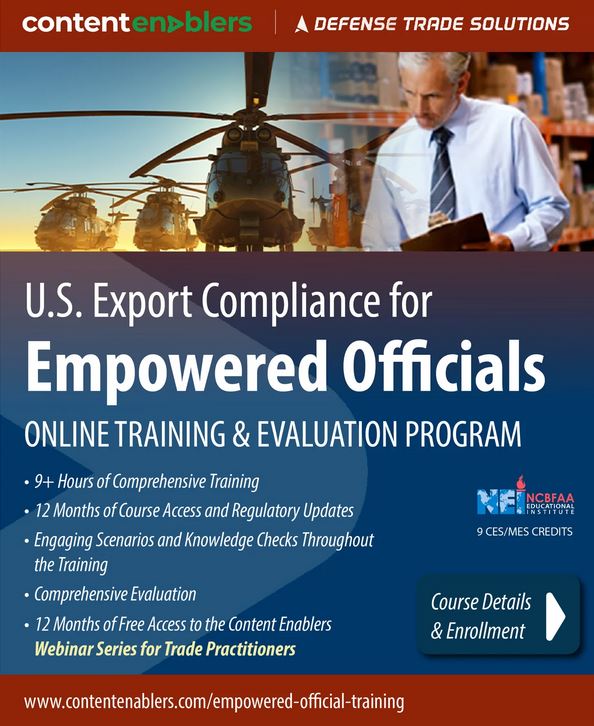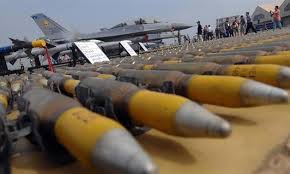In the highly regulated defense and aerospace sectors, ensuring compliance with the International Traffic in Arms Regulations (ITAR) is essential. One of the fundamental aspects of ITAR compliance is determining whether an item or service falls under ITAR jurisdiction and correctly classifying it if it does. This process, known as the ITAR Order of Review… Read More
ITAR Empowered Officials: Essential Training Requirements for Compliance and Success
At Defense Trade Solutions, we understand that maintaining compliance with the International Traffic in Arms Regulations (ITAR) is paramount for companies involved in the defense and aerospace sectors. A critical component of ITAR compliance is the designation and training of Empowered Officials (EOs). These individuals play a pivotal role in ensuring that their organizations adhere… Read More
Key Considerations for Acquiring an ITAR-Registered Company: A Guide by Defense Trade Solutions
Acquiring an ITAR-registered company can be a strategic move for businesses looking to expand their footprint in the defense and aerospace industries. However, the process comes with a unique set of challenges and considerations due to the stringent regulations imposed by the International Traffic in Arms Regulations (ITAR). At Defense Trade Solutions, we understand the… Read More
Understanding ITAR Export License Provisos: A Comprehensive Guide
In the intricate world of international trade and defense, the International Traffic in Arms Regulations (ITAR) serves as a crucial framework governing the export and import of defense-related articles and services. A fundamental aspect of ITAR compliance involves understanding and adhering to export license provisos. These provisos are specific conditions or restrictions attached to an… Read More
The Role of DTSA in ITAR and FMS
In the complex and highly regulated landscape of defense trade and export controls, the Defense Technology Security Administration (DTSA) plays a pivotal role. Understanding the DTSA’s responsibilities and its impact on the International Traffic in Arms Regulations (ITAR) and Foreign Military Sales (FMS) is essential for any organization involved in defense exports. This blog post… Read More
Navigating ITAR Implications for Developmental Technology
In the dynamic and high-stakes world of defense technology, adherence to regulations is crucial. Among these regulations, the International Traffic in Arms Regulations (ITAR) play a pivotal role in guiding the development, transfer, and use of defense-related technology. For companies and entities involved in the creation of developmental technology within the defense sector, understanding ITAR’s… Read More
Understanding ITAR Part 129 Requirements: A Comprehensive Guide
The International Traffic in Arms Regulations (ITAR) is a critical component of United States national security and foreign policy, ensuring that defense-related technologies do not fall into the wrong hands. One of the essential parts of ITAR is Part 129, which deals with the registration and licensing requirements for brokers involved in the export of… Read More
Case Studies of Successful Foreign Military Sales (FMS) Programs
Foreign Military Sales (FMS) programs have been a cornerstone of international defense cooperation, enhancing the security capabilities of allied nations and strengthening geopolitical alliances. These programs, facilitated by the U.S. government, provide foreign allies with defense articles, services, and training. Here, we explore some notable case studies of successful FMS programs, illustrating their significant impact… Read More
Demystifying ITAR Part 120.32: Understanding Defense Services and Ensuring Compliance
In the ever-evolving landscape of global security and defense, regulations play a pivotal role in safeguarding sensitive technologies and information. The International Traffic in Arms Regulations (ITAR) stands as a cornerstone in this realm, aiming to control the export and import of defense-related articles and services. Central to ITAR is Part 120.32, which delineates what… Read More
Safeguarding Secrets: A Guide to Conducting a Critical Program Information (CPI) Assessment
Protecting sensitive information is paramount, especially when it comes to critical programs vital for national security and defense. Critical Program Information (CPI) refers to data that, if compromised, could potentially undermine the effectiveness or security of military systems, technologies, or operations. Conducting a thorough CPI assessment is essential for identifying vulnerabilities and implementing robust safeguards… Read More








